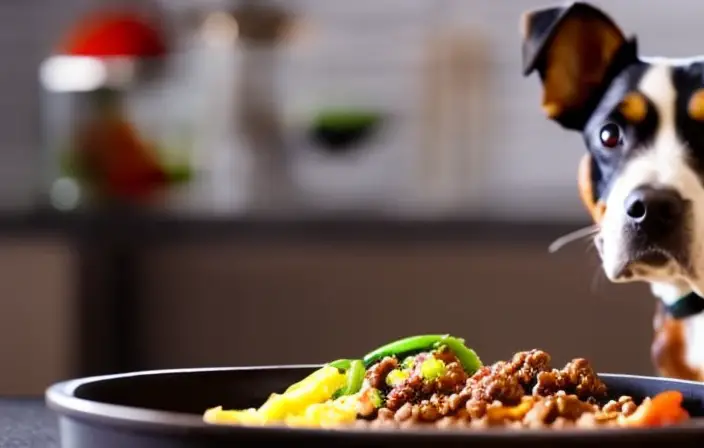Can Dogs Eat Cold Chicken
Do you ever wonder if your furry friend can enjoy the same meals as you? Well, the answer might surprise you. Can dogs eat cold chicken? In this article, we will delve into the nutritional benefits and potential risks of feeding your dog cold chicken.
We will also provide safe preparation and storage tips, as well as alternative protein sources to consider. Get ready to discover the power of incorporating cold chicken into your dog’s diet.
Key Takeaways
- Cold chicken is easy to digest and can alleviate gastrointestinal issues.
- Chicken is a lean source of protein, essential for muscle growth and repair.
- Cold chicken can be a great option for dogs with sensitive stomachs or dietary restrictions.
- Safe cooking methods and proper storage are necessary to minimize the risks of bacterial contamination and digestive issues.
Nutritional Benefits of Cold Chicken for Dogs
You’ll be pleased to know that cold chicken can provide several nutritional benefits for your dog.
When it comes to health concerns, cold chicken can be a great option for dogs with sensitive stomachs or dietary restrictions. Cold chicken is easy to digest and can help alleviate gastrointestinal issues.
Additionally, chicken is a lean source of protein, which is essential for muscle growth and repair. It also contains important vitamins and minerals, such as B vitamins, iron, and zinc, which support overall health and immune function.
When preparing cold chicken for your dog, it’s important to use safe cooking methods. Make sure to cook the chicken thoroughly to eliminate any potential bacteria. Avoid using seasonings or additives that may be harmful to dogs.
Potential Risks of Feeding Dogs Cold Chicken
Feeding your furry friend cold chicken may pose certain risks.
While dogs can generally tolerate cooked chicken as part of their diet, serving it cold can increase the risk of bacterial contamination. Cold chicken is more likely to harbor harmful bacteria like Salmonella or Campylobacter, which can cause serious illness in dogs and humans alike. These bacteria can lead to symptoms such as diarrhea, vomiting, and fever in dogs.
Additionally, cold chicken may also cause potential digestive issues for your pet. Cold food can be harder for dogs to digest, potentially leading to discomfort, bloating, or even gastrointestinal upset.
To ensure the safety and well-being of your dog, it’s best to serve them cooked chicken at an appropriate temperature to minimize the risks of bacterial contamination and digestive issues.
Safe Preparation and Storage of Cold Chicken for Dogs
When preparing and storing chicken for your furry friend, it’s important to follow proper safety guidelines to ensure their well-being. Safe storage and cooking methods are crucial to prevent any potential risks associated with feeding dogs cold chicken. Here are some guidelines to ensure the safety of your dog’s food:
| Safe Storage | Cooking Methods |
|---|---|
| – Store chicken in airtight containers or freezer bags to prevent bacterial growth. | – Cook chicken thoroughly to kill any harmful bacteria such as salmonella. |
| – Keep chicken refrigerated at temperatures below 40°F to slow down bacterial growth. | – Avoid using seasonings and spices that may be harmful to dogs. |
| – Use chicken within 2-3 days if refrigerated, or freeze it for up to 4 months. | – Always remove bones before feeding chicken to your dog to prevent choking hazards. |
| – Avoid defrosting chicken at room temperature; instead, thaw it in the refrigerator or using cold water. | – Opt for lean, skinless chicken to minimize the risk of digestive issues. |
How to Introduce Cold Chicken Into Your Dog’s Diet
To introduce cold chicken into your furry friend’s diet, gradually incorporate small portions into their meals. Introducing raw meat to your dog’s diet can provide numerous benefits, such as improved digestion, healthier skin and coat, and increased energy levels.
However, it’s important to modify your dog’s feeding schedule accordingly. Start by substituting a small portion of their regular meal with cold chicken, ensuring that it’s properly cooked and free from any seasonings or additives.
Monitor your dog’s response and gradually increase the amount of chicken over time. It’s crucial to consult with your veterinarian before making any significant changes to your dog’s diet, as they can provide personalized recommendations based on your dog’s specific needs.
With proper introduction and monitoring, cold chicken can be a nutritious addition to your dog’s diet.
Alternative Protein Sources for Dogs Instead of Cold Chicken
If you’re looking for alternative protein sources, consider incorporating fish or lean meats into your dog’s diet. Fish, such as salmon or sardines, are excellent sources of protein and omega-3 fatty acids, which promote a healthy coat and skin. Lean meats like chicken or turkey provide essential amino acids and vitamins. These protein sources can be cooked and added to your dog’s meals in appropriate portions.
While plant-based options can be included in homemade dog food, it’s important to ensure that your furry friend receives the right balance of nutrients. Remember to consult with your veterinarian to ensure that you’re meeting your dog’s specific nutritional needs.
Frequently Asked Questions
Can Dogs Eat Raw Chicken Instead of Cold Chicken?
Raw chicken can be risky for dogs due to the potential for bacteria, such as salmonella. It’s best to stick to cooked chicken, which offers essential nutrients and is safer for your furry friend.
What Are Some Signs of Food Poisoning in Dogs From Eating Cold Chicken?
If you’re wondering about signs of food poisoning in dogs from eating cold chicken, it’s important to note that dogs should not eat raw chicken. Symptoms may include vomiting, diarrhea, and lethargy.
Can I Give My Dog Chicken Bones From Cold Chicken?
Giving dogs cooked chicken is generally safe, but it’s important to avoid giving them bones, especially from cold chicken. Cold chicken can pose a choking hazard and may splinter, causing injury to your dog’s digestive system.
Are There Any Specific Guidelines for Storing Cold Chicken for Dogs?
When storing cooked chicken for your dog, it’s important to follow specific guidelines to ensure its freshness and safety. Incorporating cold chicken into your dog’s diet can be a healthy and convenient option.
Can I Mix Cold Chicken With Other Dog Foods Like Kibble or Canned Food?
Mixing cold chicken with kibble or canned food for dogs can have both risks and benefits. While it can provide extra protein and flavor, it may also cause digestive issues. Consult your vet for guidance.
Conclusion
In conclusion, while cold chicken can provide nutritional benefits for dogs, it’s important to be aware of the potential risks and to follow safe preparation and storage practices.
Introducing cold chicken into your dog’s diet should be done gradually and in moderation. If you prefer to explore alternative protein sources, there are plenty of options available that can meet your dog’s dietary needs.
Remember to consult with a veterinarian to ensure your dog’s specific nutritional requirements are being met.

If Richie Bedard is a dog food expert, author, or any other figure in the field of dog nutrition that emerged after September 2021,






